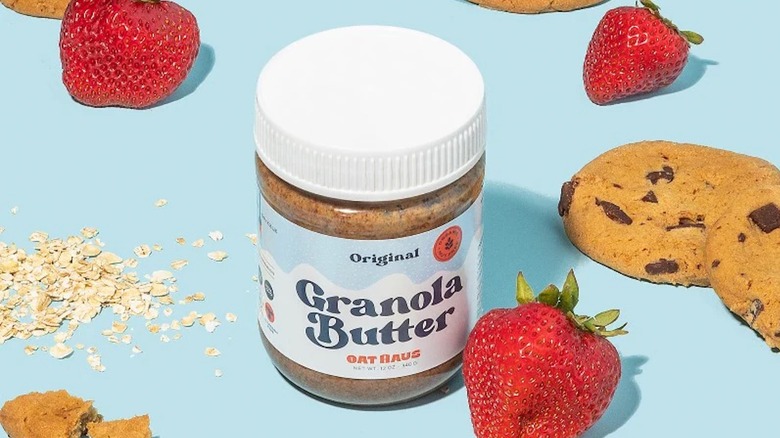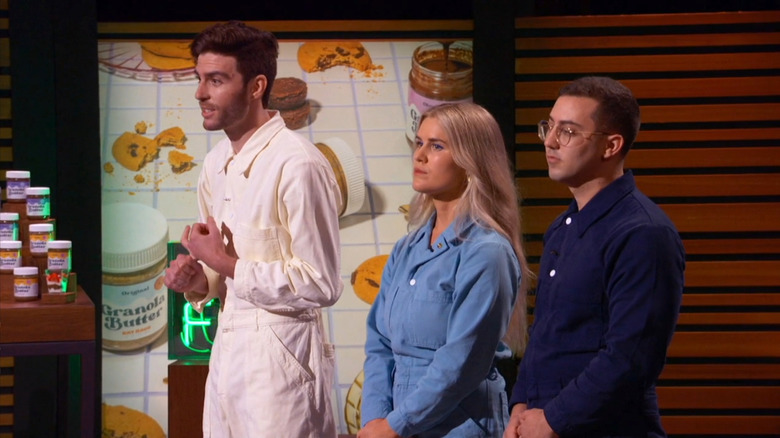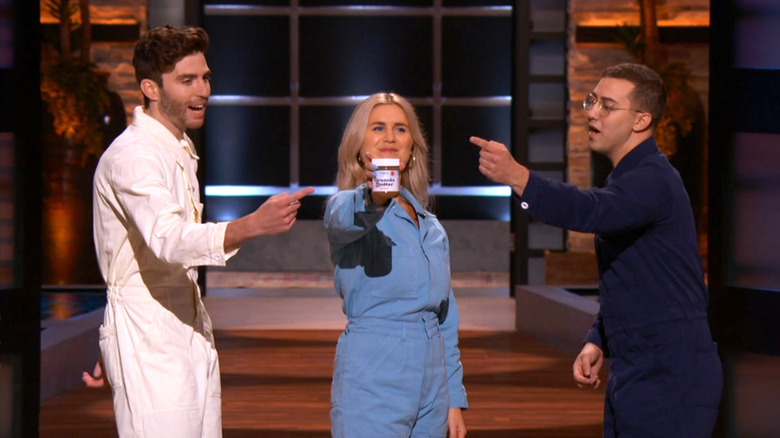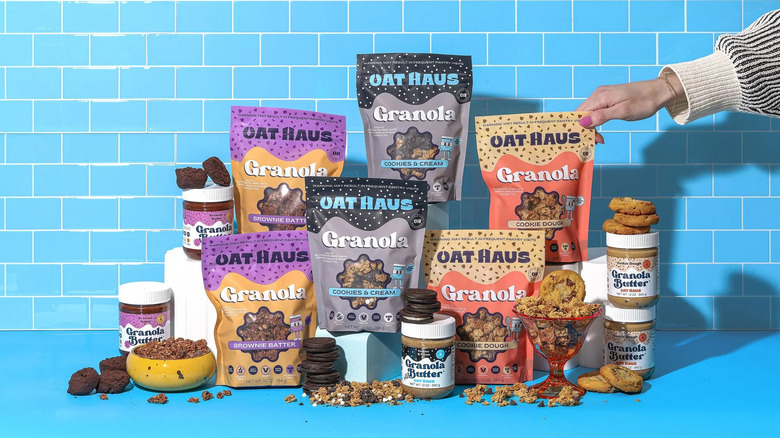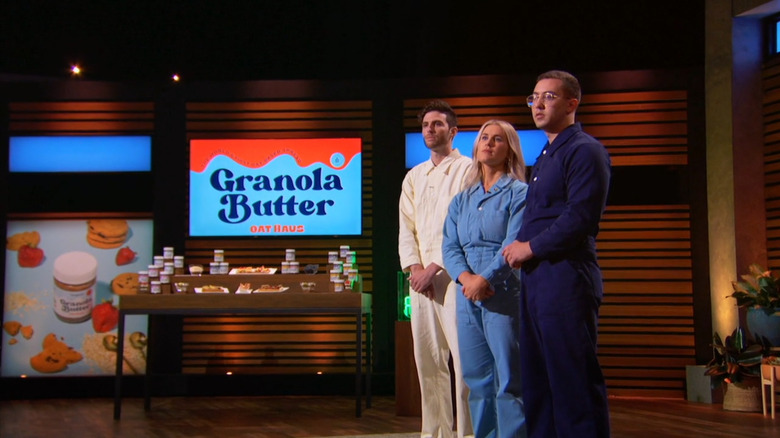Where Is Oat Haus From Shark Tank Today
We may receive a commission on purchases made from links.
Peanut butter is no longer the only nut butter option out there. Whether you like it smooth or chunky, there are now so many options on the market that you made need a guide on all the types of nut and seed butters and how to use them. However, despite the diverse selection of butters — including nut-free seed butters for those with allgeries — Oat Haus was the first brand that thought to use oats to make a spread.
Granola butter was born out of co-founder Ali Bonar's recovery from an eating disorder. After years of keeping nut butters out of her diet, Bonar tried to start eating them again, but her stomach responded negatively. She then found herself unable to find a healthy nut-free spread that she enjoyed. So, she teamed up with her long-term partner, Erik Katz, and their friend, Ari Schraer (the chef of the granola butter) to found Oat Haus in 2018.
Oat Haus' granola butter is marketed as the world's first oat-based spread. Its original granola butter is made from oats, flaxseed, olive oil, maple syrup, rosemary extract, and spices — it's free of the top eight allergens, including nuts, soy, and dairy. An 12-ounce jar costing around $12.95 and the brand offers various flavors, such as cinnamon roll, vanilla, and cookie dough.
Before going on "Shark Tank," Oat Haus had already made $2.7 million in sales, but the founders wanted to continue to grow the business with the helps of the Sharks. So when they pitched with a well-choreographed song and dance sporting their coordinated jumpsuits, was their presentation and product enticing enough for the Sharks to invest?
What happened to Oat Haus on Shark Tank?
The Oat Haus founders appeared on Season 13, Episode 3 of "Shark Tank," seeking $375,000 for 5% ownership of the company. As they pitched their product, they emphasized their granola butter is different from the "boring" spreads typically found in kitchen cabinets. The entrepreneurs claimed Oat Haus' granola butter will be the "next generation of granola."
The business partners gave the Sharks four flavors to sample — original, vanilla, chocolate, and blueberry. Almost all the Sharks complimented the different flavors, with Lori Greiner commenting that the butter had a "fantastic" aroma. However, Kevin O'Leary said the spread had too much of a soup-like consistency.
The Sharks were impressed by Oat Haus's lifetime sales numbers, asking for more details. The founders explained that they made $156,000 in their first year and were projected to make $2.5 million in 2021. Further, Eric Katz explained the company had received investments from several successful food entrepreneurs.
Mark Cuban was the first to drop out, stating that he doesn't understand how Oat Haus' products are different from what's already on the market. One by one, all the Sharks opted out, many of them stating that they enjoyed the product but that it just wasn't the right fit. In the post pitch segment, Ali Bonar lightheartedly said, "You know, honestly, it just adds fuel to the fire. You know, I want the Sharks to really look back and realize, 'Shoot, I missed a huge opportunity and now Oat Haus is on the moon and I'm down here on planet Earth.'"
Oat Haus after Shark Tank
They may not have secured a deal with any of the Sharks, but Oat Haus co-founder Ali Bonar told Philadelphia Business Journal that sales spiked 300% after appearing on the show. Bonar explained that they were grateful for the Sharks' help, despite not securing a deal — they even thickened the consistency of the product as a response to Kevin O'Leary's complaint. Plus, their appearance on the show widened their target demographic — Bonar said that, previously, mostly younger people made up the majority of its buyers but that "Shark Tank" allowed the company to expand beyond that bracket.
On top of the financial success Oat Haus has received as a result of "Shark Tank," Bonar is happy to have gotten an important message out into the world. "It's about much more than just numbers, which is always important," she told Philadelphia Business Journal. "I'm glad we were able to reach people with my story and I've already had people reaching out who are struggling with eating disorders."
With an expanding business post-show, the company added a customer service representative and new fulfillment and production team members, according to Philadelphia Business Journal. Additionally, in late 2021, it tapped actress Jameela Jamil as an investor and social impact advisor, per a press release. In her role, Jamil, who has a history with eating disorders herself, was to help "empower others to love themselves and find joy in food" and "help affect change through [the] brand on a larger scale."
Is Oat Haus still in business?
Oat Haus is, indeed, still in business. Its products can be found in mainstream retailers nationwide, including Whole Foods, Erewhon, Gelson's, Target, and Sprouts, as well as over 100 midwestern Costco locations. Additionally, you can order Oat Haus products online, either on its website or on Amazon. Further, the Oat Haus product line has expanded. It has new granola butter flavors to choose from, such as birthday cake, cookies and cream, banana bread, and brookie (as in, the tasty dessert that's a combination of cookie and brownie).
But the evolution of Oat Haus doesn't stop there — it has also started selling traditional granola (with its own unique flavors of course). This means that Oat Haus fans can start enjoying the granola with their morning yogurt — or elevating store-bought granola by using it to make crunchy chocolate bark, or using it as an ice cream topping. Each 11-ounce bag of granola costs $9.95. The granola flavors include many of the same granola butter flavors, such as banana bread and cookie dough, as well as unique options such as maple graham and vanilla blueberry. Oat Haus also offers bundles, of both the granolas and the granola butters, to save a bit of money if you buy in bulk.
What's next for Oat Haus and its founders?
Even with the success, Ali Bonar, Erik Katz, and Ari Schraer are sticking with what they know. In 2025, Bonar told Cleveland Business Journal that they still make everything from scratch — a process that includes toasting and grinding the granola for each flavor. The made-from-scratch process actually led to the company relocating from Philadelphia to Cleveland. Bonar told Cleveland Business Journal that they chose the location because it had the type of manufacturing facilities that they needed to make their products the way that they wanted to — their needs included high ventilation and a lot of electrical power for the high-powered blending machines.
In a March 2025 interview with DearFoundHer..., when asked what's next for the company, Bonar said that she and her co-founders are just excited to be launching new products. "[We] love the spread category, obviously, that's where we started, but if you think about it, it's not the fastest moving category. You're not buying peanut butter [or] granola butter every time you go to the grocery store." She added, "I've been really lucky that we've been able to grow within that category, but I think we could grow more quickly and reach other people through faster moving categories." This aligns with the launch of Oat Haus granola, which consumers are likely to buy more frequently than a jar of granola butter. And with the launch of new products being on the company's mind, we may just see even more new products from Oat Haus in the near future.
